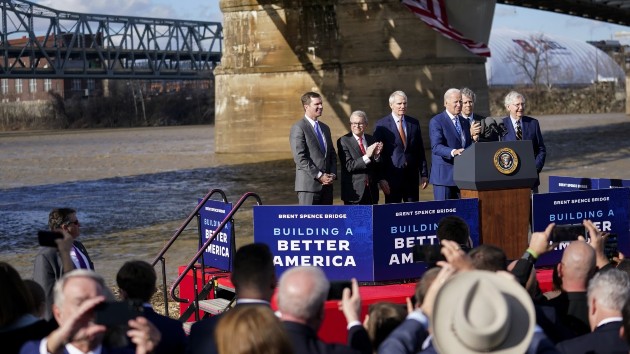
(PHOENIX) — Ground-breaking events. Presentations of preposterously oversized checks. Ribbon-cutting ceremonies — especially ribbon cuttings.
Increasing the in-your-face representations of things like a new battery manufacturing plant opening or the beginning of bridge construction — the fruits of the Inflation Reduction Act, the bipartisan infrastructure deal or the CHIPS and Science Act, all of which were championed by the White House — are how a group of generally popular Democratic governors think unpopular President Joe Biden can help improve his standing with the public ahead of a cutthroat election year.
After all, these governors said, that strategy has helped some of them win their own tough reelection fights.
“People love the announcement and love the groundbreaking, but the ribbon cutting is reality. Sometimes people talk down about when we present big checks. Well, that’s when the funding comes,” Gov. Andy Beshear told reporters at the Democratic Governors Association (DGA) winter meeting on Saturday, fresh off his 5% victory in ruby red Kentucky last month.
Biden, who continues to face strikingly poor poll numbers, has shown up at multiple such ceremonies, including in Kentucky. He visited in January alongside high-profile Republicans to address new funding that allowed improvements on the Brent Spence Bridge.
The governors think that’s where he should stay.
“I would be doing shovels or ribbons — morning, noon and night,” said New Jersey Gov. Phil Murphy, the outgoing DGA chairman.
Some of the Democratic Party’s most prominent governors — including those, like Beshear, who have shrugged off Biden’s poor rating with the public to win notable elections — gathered in the Arizona desert over the weekend; there, they reckoned with the struggle of their party’s leader despite Democrats state-level success in recent years.
It’s not just Beshear: With a handful of exceptions like in Georgia and Mississippi, Democratic gubernatorial candidates have been elected in various marquee races and battlegrounds across the country, sometimes by double-digit margins.
“This is the best, most talented group of Democrats in my lifetime,” California Gov. Gavin Newsom said on Friday.
“If I’m Biden, I want [Minnesota Gov. Tim] Walz on every damn show — Gretchen [Whitmer, of Michigan] — I mean, all these people,” Newsom said.
Walz, the incoming DGA chairman, agreed: “I think in some states, these governors will definitely help the president, pull the president up.”
The DGA raised around $30 million in 2015 and $43 million in 2019. Now, the organization is slated to raise $70 million by the end of 2023, according to Murphy. But Biden’s approval remains around 37%, according to 538’s analysis of national poll data — which could predict major challenges for him in his reelection fight next year.
Walz, like the other governors at the gathering, pinned Biden’s unpopularity on a lack of public awareness or acknowledgment for an economy that’s generally been strong and staying that way — perhaps due to the lag between some of his landmark legislation and its implementation on the ground.
At the same time, however, Americans have repeatedly voiced sharp disapproval of the high rate of inflation, which has fueled a cost-of-living crunch that has taken months and months and months to slowly curb.
“There’s a general malaise, and I think oftentimes the natural tendency is to blame the guy at the top,” North Carolina Gov. Roy Cooper, the term-limited Democrat in a state that voted for former President Donald Trump twice, told ABC News.
“I believe as this next year comes about, and we continue to educate the public about the generational changes that President Biden has made, more people will begin feeling it,” Cooper argued.
In a general election that appears — at this early point — to be headed for a rematch between Biden and former President Donald Trump, a number of the Democratic governors offered their own takes on how Biden could notch victories in their states.
Kansas Gov. Laura Kelly, the DGA vice chairwoman, warned the president to avoid talking about Trump and to remain authentic. Kelly suggested that includes avoiding topics he may not be as comfortable discussing publicly — namely abortion access, despite some swing state voters saying the issue has been a key one for them at the ballot box.
“I’m Irish Catholic, just like President Biden. I don’t talk about abortion … And I’m pro-choice, absolutely. And I know it was an issue last August. It was a topic of conversation. But I didn’t talk about it,” said Kelly, who was reelected governor by about two points in 2022.
Last August, a bid to remove abortion protections from Kansas’ state constitution was defeated by about 17 points.
Others disagreed with avoiding the topic of reproductive rights. Biden, for his part, has been vocal about supporting abortion access since the nationwide protections of Roe v. Wade were reversed in 2022.
“I think it’s widely known that [abortion] is probably an uncomfortable reality for him,” Murphy said of the president. “But I think we need to forget the political fallout.”
Cooper similarly said he thinks Biden should “be talking about protecting women’s reproductive freedom” in North Carolina — a state that Biden lost by just over a point in 2020 and one that could be his most competitive in 2024.
Other governors contended with the public’s pervasive concern about Biden’s age.
In a survey conducted by ABC News and The Washington Post in September, three-quarters of Americans said the 81-year-old president was too old to run for another term. Only half of Americans thought the same of 77-year-old Trump.
“I’d joke about it. Talk about the wisdom of [93-year-old investor] Warren Buffett and countless other examples who are 15 years older than he is. I would own it,” Murphy said.
Copyright © 2023, ABC Audio. All rights reserved.
